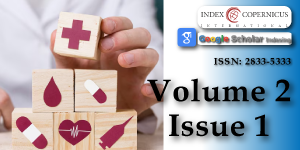Institutional capacity of health care institutes for diagnosis and management of common genetic diseases - A study from a north coastal district of Andhra Pradesh
Main Article Content
Abstract
Background: In India, the genetic disease is a disregarded service element in the community health- protection system. This study aims to gauge the accessibility of services for treating genetic disorders and also to evaluate the practices on deterrence and management services in the district health system.
Methods: A cross-sectional survey of selected health amenities from 454 medical officers (MO’s), 94 accredited social health activist (ASHAs) workers, 86 multipurpose health assistant-female (MPHA-F), 34 multipurpose health assistant-male (MPHA-M), 14 multipurpose health supervisors-female (MPHS-F), 10 multipurpose health supervisors-male (MPHS-M), 6 multipurpose health extension officer/ community health officer (MPHEO/CHO), 10 public health nurse (PHN), 45 lab technicians (LT’s) working in the government health sector and 254 in the private health sector, 409 nursing staff working in the government health sector and 995 in the private health sector, 15 primary health centers (PHC’s), 4 community health centers (CHC’s), 1 district government hospital (DGH), 3 referral hospitals (RH’s). From the side of private health institutions 25 corporate hospitals (CH’s), 3 medical colleges (MC’s), and 25 diagnostic laboratories (DL’s) were conducted.
Results: The findings show that adequate staff was in place at more than 70% of health centers, but none of the staff have obtained any operative training on genetic disease management. The largest part of the DH’s had rudimentary infrastructural and diagnostic facilities. However, the greater part of the CHC’s and PHC’s had inadequate diagnostic facilities related to genetic disease management. Biochemical, molecular, and cytogenetic services were not available at PHC’s and CHC’s. DH’s, RH’s, and all selected medical colleges were found to have offered the basic Biochemical genetics units during the survey. In 24% of CH’s, the basic biochemical units are available and 32% (8 out of 25) of DL’s have the advanced biochemical genetics units by study. Molecular genetics units were found to be available in 28% (7 out of 25) of DL’s during the study. About 6 (24%) diagnostic centers of cytogenetic laboratories were located in the Visakhapatnam district under the private sector.
Conclusion: The district health care infrastructure in India has a shortage of basic services to be provided for the genetic disorder. With some policy resolutions and facility strengthening, it is possible to provide advanced services for a genetic disorder in the district health system.
Article Details
Copyright (c) 2021 Pagolu KR, et al.

This work is licensed under a Creative Commons Attribution 4.0 International License.
Chokshi M, Patil BKR, Neogi SB, Sharma J, Paul VK, et al. Health systems in India. J Perinatol. 2016; 36: 9-12. PubMed: https://pubmed.ncbi.nlm.nih.gov/27924110/
Jindal AK. Universal health coverage: the way forward. Indian J Public Health. 2014; 58: 161-167. PubMed: https://pubmed.ncbi.nlm.nih.gov/25116821/
Jaysawal N. Rural Health System in India: A Review. Int J Social Work Human Ser Practice. 2015; 3: 29-37.
Ravi S, Gupta D, Williams J. Restructuring the Medical council of India. Brookings India. Impact Series. 2017.
Shubha RP, Ratna DP, Prajnya R. Prenatal screening for genetic disorders: suggested guidelines for the Indian scenario. Indian J Med Res. 2017; 146: 689-699. PubMed: https://pubmed.ncbi.nlm.nih.gov/29664026/
Bell SG. Ethical implications of rapid whole-genome sequencing in neonates. Neonatal Netw. 2018; 37: 42-44. PubMed: https://pubmed.ncbi.nlm.nih.gov/29436358/
Clark MM, Hildreth A, Batalov S, Ding Y, Chowdhury S, et al. Diagnosis of genetic diseases in seriously ill children by rapid whole-genome sequencing and automated phenotyping and interpretation. Sci Transl Med. 2019; 11: eaat6177. PubMed: https://pubmed.ncbi.nlm.nih.gov/31019026/
GUaRDIAN Consortium, Sridhar S, Vinod S. Genomics of rare genetic diseases-experiences from India. Hum Genomics. 2019; 13: 14: 52. PubMed: https://pubmed.ncbi.nlm.nih.gov/31554517/
ICMR’s ethics guidelines. National ethical guidelines for biomedical and health research involving human participants. Indian Council Med Res. 2017.
Venugopal A, Chandran M, Eruppakotte N, Kizhakkillach S, Breezevilla SC, et al. Monogenic diseases in India. Mutation Res. 2018; 776: 23-31. PubMed: https://pubmed.ncbi.nlm.nih.gov/29807575/
Verma IC, Bijarnia S. The burden of genetic disorders in India and a framework for community control. Community Genet. 2002; 5: 192-196. PubMed: https://pubmed.ncbi.nlm.nih.gov/14960891/
Jain R, Rao B. Role of laboratory services in primary health center (PHC) outpatient department performance: an Indian case study. Prim Health Care Res Dev. 2019; 20: e112.
Recommended Universal Screening Panel. https://www.hrsa.gov/advisory-committees/heritable-disorders/rusp/index.html.2020
Graf von der Schulenburg JM, Frank M. Rare is frequent and frequent is costly: rare diseases as a challenge for health care systems. Eur J Health Econom. 2015; 16: 113-118. PubMed: https://pubmed.ncbi.nlm.nih.gov/25355295/
Mookken T. Universal Implementation of Newborn Screening in India. Int J Neonatal Screen. 2020; 24: 6: 24. PubMed: https://pubmed.ncbi.nlm.nih.gov/33073021/
Mookken T, Cariappa R. (NeoGen Labs, Bangalore, Karnataka, India). Personal communication. 2019.
Aggarwal S, Phadke SR. Medical genetics and genomic medicine in India: current status and opportunities ahead. Molecular Gene Genom Med. 2015: 160-171. PubMed: https://pubmed.ncbi.nlm.nih.gov/26029702/
National Policy for Treatment of Rare Diseases. 2021. https://mohfw.gov.in/sites/default/files/RareDiseasesPolicyFINAL.pdf
Indian Rare Disease Registry. 2019. http://bmi.icmr.org.in/irdr/index.php

